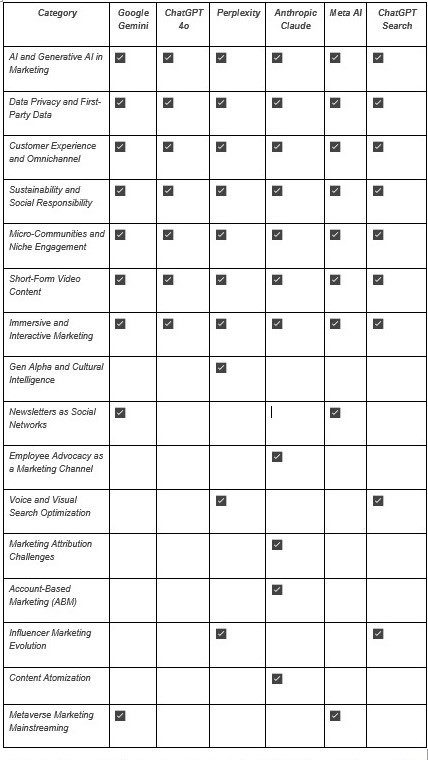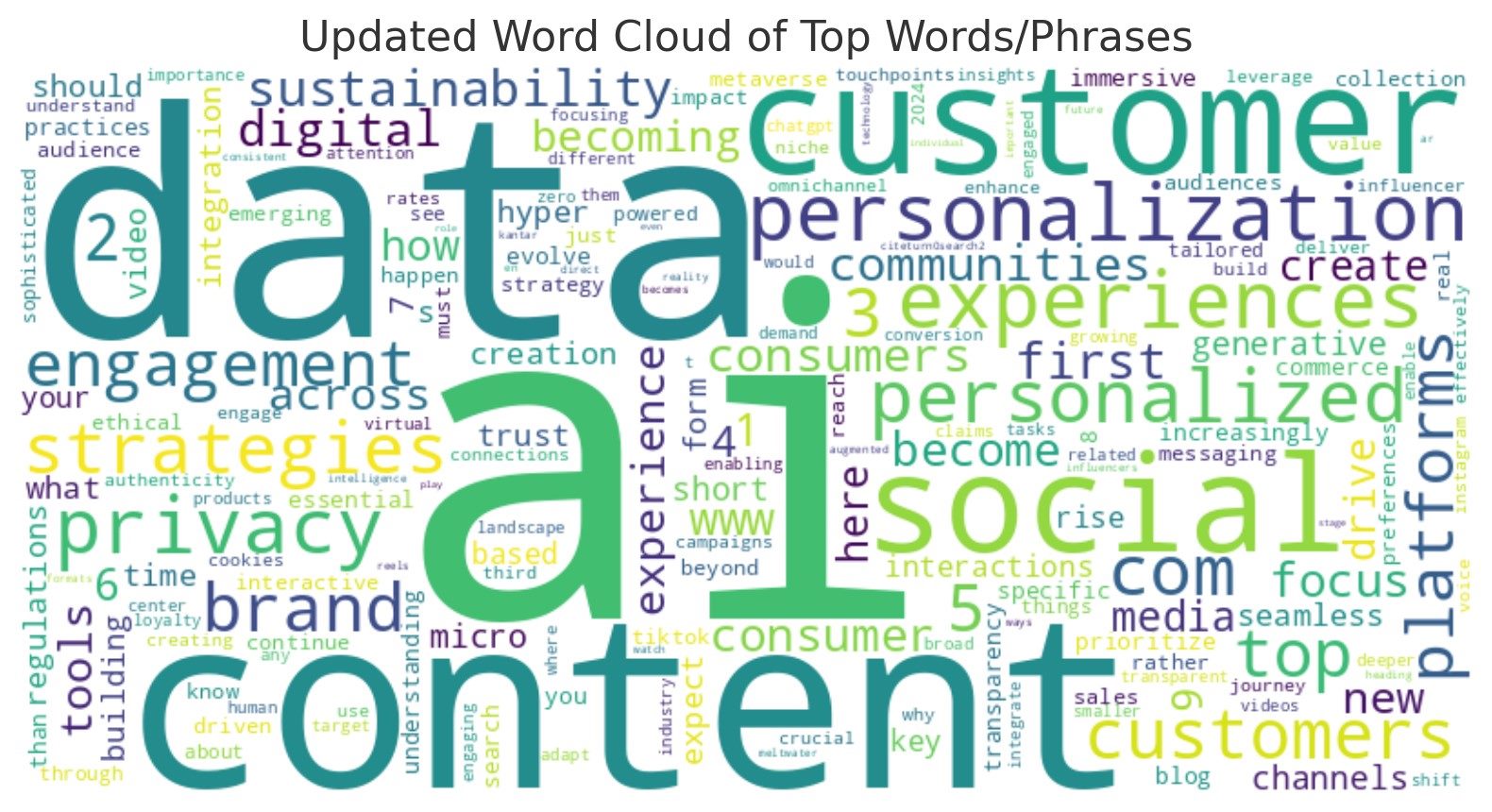The Gist
- Generative AI predictions. Generative AI tools predict significant marketing trends for 2025, including hyper-personalization, data privacy and omnichannel integration.
- Data privacy importance. First-party data and privacy-first approaches will dominate as third-party cookies phase out. Marketers will increasingly rely on secure, ethical data collection practices.
- Emerging concepts. Agentic AI, synthetic personas and democratized data are set to transform marketing decision-making in the coming year.
It’s prediction time, everyone! Far be it from me to shy away from the annual set of predictions, but this year I wanted to more fully embrace generative AI. I performed an experiment with the technology, while also providing a few predictions of my own.
What I would come to find from doing this exercise is that my top three marketing trends weren’t even “on the radar” of six of the top generative AI applications, and while their recommendations for marketers were helpful, there is still room for humans to work with AI to push all of us forward.
Table of Contents
- Marketing Trends According to Generative AI
- Analyzing Marketing Predictions: AI vs. Human Insights
- 3 Marketing Recommendations From a Human Perspective
- Key Trends and Insights Shaping Marketing This Year
- Core Questions Around 2025 Marketing Trends
Marketing Trends According to Generative AI
Let’s start by exploring what six major generative AI applications suggest marketers should focus on in the coming year. Here are the methods I used to do this.
The Research
Here are a few notes and caveats on my research method.
-
First, I welcome constructive feedback from researchers on my methods, but I did my best to do a proper experiment by asking the same questions within a short period of time (24 hours) and by documenting the full text response from each provider.
-
There is also a rather large caveat regarding the timeliness of information that the large language models (LLMs) use in most of the generative AI applications. In other words, some models have only crawled the web through a date that precedes December 2024, so it is a fair assertion that those models may be at a disadvantage as far as 2025 predictions go.
-
Finally, there is a high likelihood that at least some of the results I’ve gotten have been biased by my prior usage of these tools.
That said, if we were to draw a comparison between AI and humans, there are many of us that get busier at work during certain times of the year and get a little behind on their reading. Still, we’re expected to have an opinion on what is up and coming.
To conduct this experiment, I started by asking the following questions verbatim to several generative AI tools on December 30 and 31, 2024.
-
What are your top 5 marketing-related predictions for 2025?
-
Give me a list of the top 10 things marketers should know heading into 2025.
These are the generative AI tools I used:
-
Google Gemini Advanced (through Google Workspace)
-
OpenAI ChatGPT 4o
-
OpenAI ChatGPT Search
-
Perplexity
-
Anthropic Claude (a free account)
-
Meta AI (based on Llama)
Generative AI Marketing Predictions: Generative AI, Data Privacy and Customer Experience
I then copied all the responses, organized by platform and questions into a document and fed that back into ChatGPT 4o to analyze the responses for me. The first thing I did was ask ChatGPT for a general summary of the top three marketing trends showing up in the predictions. Here are the top three most-mentioned ideas across the generative AI tools.
- AI and Generative AI in Marketing
- Hyper-personalization powered by AI tools.
- Generative AI's role in creating tailored content at scale.
- Predictive analytics and real-time optimization through AI.
- Data Privacy and First-Party Data
- The strategic importance of first-party and zero-party data as third-party cookies phase out.
- Ethical and privacy-first approaches to data collection and personalization.
- Customer Experience and Omnichannel Integration
- The need for seamless, consistent experiences across all channels.
- Integration of customer journey touchpoints with marketing efforts.
These marketing trends appeared consistently across the responses, which highlights their anticipated significance for marketers heading into the new year.
While that was helpful, I wanted to look deeper and get some analysis on all the individual responses. So I asked ChatGPT to group all of the responses (that’s five predictions times six platforms, plus 10 additional “items to know” from those same six platforms, for a total of 90 items). Here’s a table summarizing the categories of topics and the platforms that mentioned them.

I found it insightful to see that there were seven common areas, then several others with one or two platforms suggesting them. It appeared that there was some overlap between ChatGPT’s categories, so I did some keyword analysis as well. After removing filler words, articles and other unnecessary terms, I identified the top 10 most popular terms along with their word counts.
-
AI (60)
-
Data (42)
-
Content (38)
-
Customer (28)
-
Social (21)
-
Personalization (20)
-
Experiences (20)
-
Privacy (19)
-
Personalized (17)
-
Strategies (17)
For those who prefer a word cloud, here is an illustration of all the terms found in the set of 90 recommendations and predictions:

It’s no shocker that generative AI platforms suggested that “AI” was the top prediction or trend that marketers should know about. Of course, humans have been writing about artificial intelligence nearly non-stop since the launch of ChatGPT, as well, so I don’t know how different a study of 100% human-written content would be.
Related Article: 6 Marketing Technology Trends to Watch This Year
Analyzing Marketing Predictions: AI vs. Human Insights
Considering the caveats mentioned earlier, I’m confident in the findings. I feel reassured that much of what I discussed in this publication and in my books last year remains highly relevant.
Yet something felt missing. After all, as someone who lives, eats and breathes marketing technology and all the customer experience topics related to it, I feel very confident there are several things that should have been included in that list. This led me to draft my own set of three recommendations of what marketers and CX professionals need to know as they head into 2025. Oddly enough, none of these were even mentioned once in my research above.
3 Marketing Recommendations From a Human Perspective
Again, the three marketing trends most on my mind for the coming year weren’t even hinted at in any of the 90 suggestions I received from generative AI. Here are my three recommendations for what you should be paying attention to as 2025 kicks off.
Agentic AI: Connecting Multiple Generative AI Platforms
Chatting with AI took the world by storm and transformed the way many types of work were done. Yet, AI power users quickly noticed something.
Continuity is an issue when using many generative AI tools. They are good for short-form content ideas, but those ideas can become splintered, repetitive and disconnected when trying to create bigger, broader content pieces. They can do one thing at a time, and they struggle with multi-step processes.
Agentic AI connects the dots between multiple generative AI tools, platforms with APIs and more complex multi-step processes. Thus, instead of being driven by a simple prompt to answer a question or provide information, AI agents are able to perform more complicated tasks that involve interacting with multiple sources, applications and processes.
Expect to see more AI agents integrated into your favorite software platforms. Additionally, there will be increased discussion around multi-agent systems, where teams of AIs collaborate to perform more complex tasks on your behalf.
Synthetic Personas: Knowing Your Audience
First-party data strategies and customer data platforms (CDPs) have allowed brands to become a lot more informed about their customers. This lets them develop better segmentation, personalization and even predictive analytics. Yet, the need to innovate and continuously improve means that brands need better ways to learn and predict what consumers want as well as how they’ll react to specific content, offers and experiences.
This is where synthetic personas and synthetic research come in. These virtual personalities can be customized to match specific demographics and interests, which allows brands to do research quickly to understand and reach niche audiences. They can reduce costly research initiatives in the process.
Look for synthetic personas to gain traction as their accuracy and ROI become more evident. With some positive results plus massive cost savings compared to more traditional methods, this concept will become mainstream quicker than you might imagine.
Democratized Data-Driven Decisions
In fairness, “data” was the second most-used word, but this concept wasn’t specifically mentioned. We’ve been talking about “data-driven decisions” for a while, but realizing it requires providing better and more accessible data to the people making those decisions.
Look for new and better ways to access data and reporting from the platforms you regularly use. Some chat interfaces now allow marketers to ask for custom reports with a prompt. Meanwhile, there’s now more talk about newer concepts like warehouse native analytics. Marketers will have more and better access to customer data than ever before.
Related Article: Is Persona Research Ready for an AI-Powered Overhaul?
Key Trends and Insights Shaping Marketing This Year
In this exercise, I learned that generative AI is extremely useful for gleaning general knowledge and common ideas, as well as in analyzing data in extremely short amounts of time. There were no cutting-edge insights from generative AI because that’s really not what its purpose is.
Instead, I was able to use those AI tools to get a sense of what is already out there and to do some very quick analysis and interpretation. That’s not nothing; it saved me a ton of time. Also, by using my existing knowledge of the industry, I was able to validate that the assumptions the generative AI tools made were on the right track.
To provide some more forward-thinking marketing trends and predictions, I relied on my own efforts, along with insights from over 200 experts I interact with annually through my podcasts. I also read industry publications, write a few books a year and go to a dozen industry events annually. I covered trends at Optimizely's Opticon last fall.
I don’t know about you, but I feel reassured that all this can’t be replaced by asking a question to an LLM. The solution is not as simple as many might hope. We shouldn’t just wait for generative AI to get a little better and then simply rely on it for everything.
We’ve been playing with generative AI, learning how to interact with AI-based augmentation and changing the way we work for two years. Let’s let 2025 be the year we partner with AI in a more meaningful way. Let’s acknowledge both AI's strengths and weaknesses, as well as our own, to achieve great things together.
Core Questions Around 2025 Marketing Trends
Editor's note: Here are two important questions to ask around the latest marketing trends.
What are the top marketing trends predicted by generative AI?
Generative AI predicts key trends for 2025, including AI-driven hyper-personalization, a focus on first-party and zero-party data as third-party cookies phase out and an emphasis on seamless, omnichannel customer experiences.
What are some marketing trends for 2025?
Agentic AI for multi-step processes, synthetic personas for cost-effective research and democratized data giving marketers better access to decision-making insights.
Learn how you can join our contributor community.
